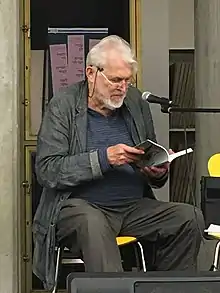Meir Wieseltier
Meir Wieseltier (Hebrew: מאיר ויזלטיר; March 8, 1941[1] – March 30, 2023)[2] was an Israeli poet and translator.
Meir Wieseltier | |
|---|---|
 Meir Wiseltier at Beit Ariela, 2021 | |
| Born | March 8, 1941 Moscow, Soviet Union |
| Died | March 30, 2023 (aged 82) Ramat Gan, Israel |
| Occupation | poet, translator, journalist |
| Language | Hebrew |
| Nationality | Israeli (since 1949) |
Biography
Meir Wieseltier was born in Moscow in 1941, shortly before the German invasion of Russia. He was taken to Novosibirsk in southwestern Siberia by his mother and two older sisters. His father was killed while serving in the Red Army in Leningrad. After two years in Poland, Germany, and France, the family immigrated to Israel. Wieseltier grew up in Netanya.
In 1955, he moved to Tel Aviv, where he has lived ever since. He published his first poems at the age of eighteen. He studied at the Hebrew University of Jerusalem. In the early 1960s, he joined a group known as the Tel Aviv Poets. He was co-founder and co-editor of the literary magazine Siman Kriya, and a poetry editor for the Am Oved publishing house.[3]
Literary career
Wieseltier published 13 volumes of verse. He translated English, French, and Russian poetry into Hebrew. His translations include four of Shakespeare's tragedies, as well as novels by Virginia Woolf, Charles Dickens, E.M. Forster, and Malcolm Lowry. Wieseltier often wrote in the first person, assuming the role of a moralist searching for values in the midst of chaos. He penned powerful poems of social and political protest in Israel.[4] His voice is alternately anarchic and involved, angry and caring, trenchant and lyric.[3]
Wieseltier was a poet in residence at the University of Haifa.[3]
Awards
Among the many awards Wieseltier received are the following:
- In 1977 and 2011 Wieseltier was the co-recipient Prime Minister's Prize for Hebrew Literary Works
- In 1994, Wieseltier was the co-recipient (jointly with Hanoch Levin) of the Bialik Prize for literature.[5]
- In 2000, he received the Israel Prize, for literature and poetry.[6][7]
Published works
- Shirim Iti'im (Slow Poems), 2000
- Merudim Vesonatot (Merudim and Sonnets), 2009
- Perek Alef, Perek Beit (Chapter 1, Chapter 2), 1967
- Meah Shirim (100 Poems), 1969
- Kakh (Take It), 1973
- Davar Optimi, Asiyat Shirim (Something Optimistic, The Making of a Poem), 1976
- Pnim Vahutz (Interior and Exterior), 1977
- Motzah El Ha-Yam (Exit into the Sea), 1981
- Kitzur Shnot Hashishim (The Concise Sixties) 1984
- Ee Yevani (Greek Island) 1985
- Michtavim Veshirim Aherim (Letters and other poems) 1986
- Makhsan (Storehouse), 1994 [Mahsan]
- The Flower of Anarchy, 2003, ISBN 978-0-520-23552-6
- Forty, 2010, (Arbaim)
- Davar Optimi, Asiyat Shirim (Something Optimistic, The Making of a Poem, a new edition + Appendix), 2012
References
- https://www.encyclopedia.com/arts/educational-magazines/wieseltier-meir-1941
- "Israel Prize winner passes away at 82". Arutz Sheva. March 30, 2023.
- Meir Wieseltier profile, PoetryInternationalweb.org. Accessed September 12, 2022
- Butt, Aviva. "A Surge of Poetry: The 'Younger Poets' of the State of Israel Period", Poets from a War Torn World. SBPRA, 2012: 27-39 (33-7).
- "List of Bialik Prize recipients 1933-2004 (in Hebrew), Tel Aviv Municipality website" (PDF). Archived from the original (PDF) on December 17, 2007.
- "Israel Prize Official Site (in Hebrew) – Recipient's C.V."
- "Israel Prize Official Site (in Hebrew) – Judges' Rationale for Grant to Recipient".
Further reading
- The Modern Hebrew Poem Itself, 2003, ISBN 0-8143-2485-1
External links
- Biography on the Institute for the Translation of Hebrew Literature
- God and Man in the Poetry of Meir Wieseltier, Speech on the occasion of Wieseltier's visit to Hebrew Union College, Stanley Nash
- The Flag Parade A poem by Wieseltier published in English by The Guardian
- Of Rebels, Wretches, Mongols and Kreplach, a tribute to Meir Wieseltier, Natan Zach, Haaretz